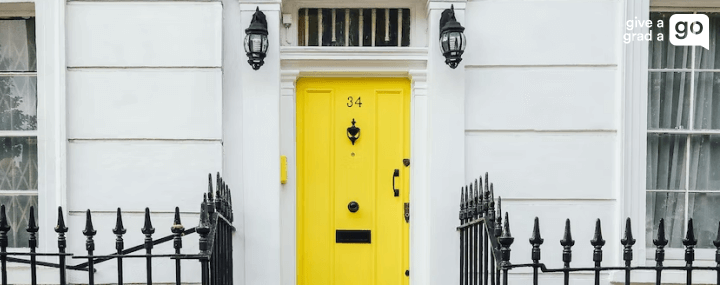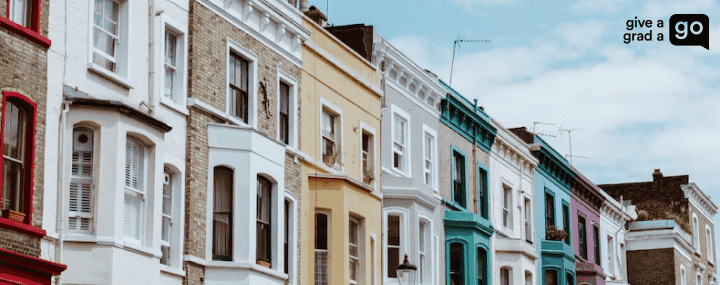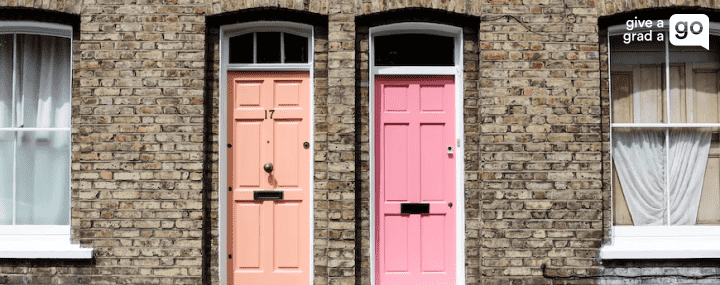Feeling excited about the future, but not sure how to begin your new chapter in London?
Moving to London, or any new city as a graduate can be very daunting, especially if you are moving to London alone.
So if you’re feeling a little anxious about taking the plunge into the bustling streets of London, remember, a lot of graduates have been in your shoes before, and it definitely can be done.
The university bubble may have burst, but these tips in our moving to London guide will help you prepare for your next step as a graduate living in London.
Moving to London checklist
-
Trying to save as a graduate will be difficult, so it is a good idea to plan how much money you’ll need to move.
Generally, you will need to pay a deposit, two months’ rent and an agency fee even before you’ve entered the building!
This might mean an extra few months at home, or selling a few more clothes on eBay alongside your graduate job, but it will be worth it in the long run and will help you keep stress levels to a minimum.
-
You might find it hard to align your move to London with friends as some may be taking a post-university gap year, or others might simply need a little longer to make the initial jump.
If you’re thinking about moving to London alone, house sharing with strangers in London is very common and gives you the chance to make new friends, which is a big plus, especially if you’re travelling a long way from home.
If you’re not keen to share your milk and butter, deciding to go solo and live alone is another factor to keep in mind when sorting out your spending!
Or work on your persuasive skills and consider moving to London with family… “Mummm please can we move to London?”
-
Try before you buy!
Even if you think you’ve seen your dream home online, it is always advisable to see the place for yourself.
Be wary of angles in photos (a camera can work wonders and make a small box room look huge!) and don’t pay your deposit until you’ve seen the property yourself.
Look at a few other options before making your final decision but try and plan your viewings so they’re spread out over a couple of days rather than a week, as places in London can get snapped up quite quickly.
Try not to feel too pressured by the agent if they ask for an answer there and then.
If you think you’ve found the place – still go away and have a think, even for half an hour before contacting the agent or landlord, but make sure you find out as much as possible at the viewing i.e. what the neighbourhood is like, what the nearest station is, how far the commute to work will be etc. – all worth considering!
-
Rooms can crop up on a number of sites, but try to follow well-known sites such as Zoopla and Right Move, steering away from any ads on unfamiliar sites, especially if you don’t know who’s posting the ads. Signing a contract is a must.
Even if your landlord doesn’t have one, press them for it.
If you do not take the necessary precautions, you might find your landlord is actually a tenant and illegally subletting the property (trust us, it can happen!)
-
Before moving in, you’ll need to pay a deposit upfront – you’ll get this back when your contract ends (providing there isn’t huge damage to the property) – it should then sit in a Tenant Deposit Scheme and paperwork will be given to you to confirm this within the first week of your tenancy.
Your landlord or agency have to put this into action, but if you’re unsure of your deposit’s whereabouts, click the link above for more guidance.
Sorting this sooner rather than later is highly advised!
-
As soon as you step foot in London, make sure you have Google Maps, City Mapper, Uber and National Rail apps at the ready.
These will make life in London a lot easier; from finding your local pub to finding your job interview, these are real game changers!
For more information, check out our graduate’s guide to getting around London.
-
Life without a once-per-term student payment can be difficult, but is doable if you plan a monthly budget.
Consider rent, travel and bill costs after each payday, then divide the remaining money between each week of the month.
Compare internet providers and don’t forget to work out your council tax!
Lunch and cocktails will be pricier as a graduate in London compared to your student days, but if you manage your earnings well, you will still be able to keep a fun social calendar.
-
If you’re moving to London and think that you might use the opportunity to get the train to explore other cities and towns around the UK, then it’s definitely worth investing in a Rail Card.
You will probably cover the cost of the card and make savings straight away on your first or second trip!
There are different Railcard options for everyone – 16-25 years Railcard, 26-30 Railcard, Senior Railcard and Family & Friends Railcard, to name a few.
With London becoming increasingly cashless, most commuters either use a contactless credit or debit card, or an Oyster card for public transport around the city, including travelling by bus, Tube (London Underground), London Overground, National Rail, TfL Rail, tram, DLR, Emirates Air Line and River Bus.
An Oyster card is a credit card-sized smart card that you top up with money and ‘pay as you go’.
Plus… You can also link your Railcard up with your Oyster card for extra savings whilst travelling around the city centre!
-
Made up of letters and numbers, your National Insurance number ensures that contributions you make and tax you pay is recorded to make sure your National Insurance contributions and tax are documented alongside your name only.
If you do not have a NI number you must apply for one, or find your NI number on the Gov website if you’ve lost it.
The NHS is the UK’s National Health Service, providing free healthcare for UK residents, apart from optical or dental treatment and some prescription charges.
Find advice on how to register with a GP practice, or head over to the NHS website for advice on NHS services if you are visiting or moving to England.
-
Take the opportunity to delve into the cultural segments of London, free of charge!
There are plenty of free museums to take advantage of e.g. Tate Modern, V&A, Museum of London, Science Museum, Natural History Museum… the list goes on!
If you’re having to tighten your purse strings a little, remember you don’t need to be cooped up indoors, London has a lot to offer a graduate on a budget and there is always something new to see, so it is impossible to run out of things to do!
Moving to London without a job
Are you planning on moving to London without a job but wondering whether it’d be possible, or if it is a sensible move?
The question we would ask you is, do you have enough money ready and saved for this expensive city?
We would recommend you have enough money saved for a few months of living expenses to ensure you are in a secure position to pay for London rent and the general cost of living.
According to Numbeo, the average monthly cost of living in London for one person is £793.42 without rent.
The average cost of rent a month in London is around £1,250 for a 1 bedroom flat, this varies depending on the location and number of rooms and tends to be lower further out of London and cheaper for house shares.
Visit London Gov for more information about average rent costs around London.
An alternative option, of course, is to ‘sofa surf’ at friends’ places in London until you find a job, but this does require knowing someone that will happily put you up for a couple of months during your job hunt!
You could also consider staying in a shared dorm in a hostel, which can be as cheap as £10!
This way you’re not tied down with any contracts in case things don’t quite work out as planned – visit Hostelworld to find deals on rooms in London.
Moving to London advice
Living in London as a student or graduate can be the best time of your life!
But there are many things that you might want to consider before you take the leap into ‘adulthood’ in the City.
Here’s some first-hand advice from graduates living in London.
- Lily Robinson, completed a master’s degree in Forensic Linguistics at Cardiff University:
“If it’s possible go and get a feel of the city before you make the move because London can feel so different depending on where you are.
See what each area has to offer as each brings it’s own positives and challenges and you want to make sure you’re living and working somewhere you enjoy. Make a list of all the things you want to see and do in your time in London.
There is so much on offer so it can be easy to get overwhelmed, plus the city has loads of free things to do which brings me to my final point… make sure you’re prepared financially! Make a budget plan for yourself and stick to it.”
- Elise Bresler, studied Psychology & Italian at Exeter University
“Moving to London can be a stressful process.
I’d recommend going directly through a landlord rather than an estate agent as it’s faster and more efficient.
Take some time to really get to know the area you’re living in so you can feel comfortable and at ease with where you’re going and what shops/restaurants are around you.
Citymapper saved my life when I moved here as it directs you straight to where you need to go.
I would also recommend diving headfirst into all activities and hobbies as it’s the best way to meet people!
It can be daunting at first as Londoners have a reputation for being reserved, but we all know everyone wants to connect and be sociable, so why not be the first?”
- Mark Scrine, studied Social Politics at the University of York
“There’s no getting away from the fact that renting in London is costly, but a lot of people manage it every year, and you just need to be a little shrewd when it comes to finding a property that’s within your budget.
Unless you get a place where bills are included, you’re going to have to budget for various monthly expenses.
These include heating electricity, water, council tax, Internet, TV, etc.
Additionally, an Oyster Card is a handy way of paying for your Tube and Bus fares.
You will want to find a cool area of London to live in and make sure that you’re within easy reach of restaurants, bars etc!
There are countless ways that you can cut down on your monthly expenditures.
One is to ditch the wasteful purchase of your lunch each day and take your food with you that you cooked at home.”






